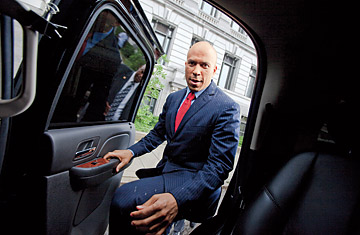
Cory Booker, Mayor of Newark, NJ, enters his SUV at City Hall while en route to a meeting.
(3 of 4)
Booker's tougher policing methods are not getting rave reviews from all residents. "It seems like the cops hate us," says DeAndre Breeland, a legal aide who lives in the South Ward. On a late-June night patrol, two cars from the Newark police department's street-crime unit zipped through some of the city's most notorious neighborhoods, slowing down to check on groups hanging out on stoops and flashing lights to make sure there was no funny business. The glares from Newarkers said it all: Get out of here. Of course, these same detractors didn't see the gang unit chase down and tackle an armed 16-year-old kid later that night. Or the street-crime unit pull out 31 vials of cocaine from under the passenger seat of a car.
Booker sticks up for his guys. "We have gotten far more aggressive, and appropriately so," he says. "We allowed in our city a high level of tolerance to build up to things that are objectionable. You should not have people dropping trou and urinating on the side of a road. You can go on. I'm sorry, but that is breaking the law."
The crime stats aren't all sterling: as the recession set in, robberies, for example, spiked 27% in 2008 and have risen 10% year to date through late June. But numbers don't tell the whole story. On June 27, a 17-year-old boy was murdered on Martin Luther King Boulevard, near one of Newark's spanking-new affordable-housing communities. "Whenever there's a murder in Newark, the city almost defaults to the terrible memories," says Clement Price, a history professor at Rutgers University, Newark, who has lived in the city for 40 years. "The statistics become meaningless."
Moving Beyond Murder
A small but passionate band of Booker critics is standing on the steps of Newark's city hall early one evening, rallying against a city plan to create a municipal water authority. Among the agitators is Amiri Baraka, a prominent, controversial African-American poet and activist. Baraka, 74, has won a trunkful of literary prizes but was essentially stripped of his New Jersey poet-laureate title after penning a post-9/11 poem that was denounced as anti-Semitic. The writer, who was reared in Newark and still lives in the city, is a voice from the civil rights era who can sound resentful of postracial politicians like Booker and Obama. To Baraka, they are profiting from the opportunities that he fought so hard to create. If any local figure is going to rant about cutting Booker's "nuts out," as Jesse Jackson did in a slip about Obama last summer, it would be Baraka.
Baraka is asked to evaluate Booker. "I give him credit. The homicide rate has gone down," says the poet. "But I don't know if you can judge the quality of life in a city by just the homicide rate. Where is the employment? Where is the education? What is in it for the residents?"
Fair questions. Booker's team can rattle off a list of accomplishments beyond murder reduction. For example, his administration has doubled the number of affordable housing units currently under construction and quadrupled the affordable stock in predevelopment. Almost a dozen parks have been refurbished. Booker's national profile and endless advocacy for Newark have attracted more than $100 million in private philanthropy — money that is even more crucial for Newark in a recession.
But as Booker well knows, philanthropy and social programming, no matter how creative, won't solve Newark's most pressing problems. Unemployment in the city rose to 13.5% in May, the city's highest level in nearly six years. Foreclosures have tripled, and boarded-up homes taint many blocks.
The mayor remains upbeat. "I don't say this in an exaggerated way, but in five years, we're going to shock the nation," Booker says. "In a way that you're kind of resuscitating people's belief in democracy and belief in the American ideals." If you're a politician who could possibly face Booker down the road, clip that quote. The city is burdened with the same drug, crime and urban-decay issues it had four, 10, 20 years ago. Booker talks a big game, and three years into his term, he has certainly impressed. But despite Booker's best efforts, 2009 Newark isn't shocking anyone.
